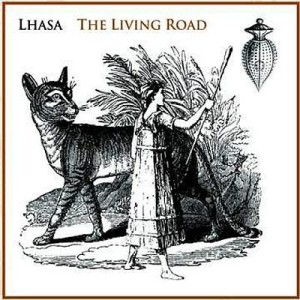 Lhasa de Sela is a Canadian singer who performs a unique blend of acoustic folk and electronica, sung in the three major languages of the North America: French, Spanish and English. This CD is brimming with passionate melody and rhythm that’s capable of moving all listeners, whether they understand the lyrics or not.
Lhasa de Sela is a Canadian singer who performs a unique blend of acoustic folk and electronica, sung in the three major languages of the North America: French, Spanish and English. This CD is brimming with passionate melody and rhythm that’s capable of moving all listeners, whether they understand the lyrics or not.
Lhasa wrote or co-wrote all the music and lyrics on this rich collection, except for “Abro la Ventana,” which was composed by Yves Desrosiers. A fairly large crew of musicians contribute to the layered but never overwhelming instrumental backing, which includes everything from theremin to glockenspiel, marimba to something called bamboo keyboard.
At the first line of “Con Toda Palabra,” delivered in Lhasa’s deep, emotive alto, the listener is hooked. Backed by looped percussion, a high-pitched drone and lightly plucked ukulele and bowed cello, she quietly sings this sensuous song of desperate love: “To love you is a prayer/the song of the mute/the eyes of the blind/the naked secret” in the English translation. Trust me, it’s even more romantic in Spanish, but it’s nice that the translations are provided in the booklet.
The album’s title is The Living Road and roads, travel, separation form a theme that runs through the songs like a sinuous highway. “The road is dark/as far as I can see./I take three steps/the road is gone,” she sings (in French) in one verse of “La Maree Haute (The High Tide).” Piano forms the backdrop to this highly symbolic and poetic love song, with a bass clarinet and B-flat clarinet playing a contrapuntal line that answers Lhasa’s sung verses.
She sings, almost chants, in English on “Anywhere On This Road,” whose lyrics reflect the life of a refugee–either a literal one, or a refugee of the heart. Sampled hand-claps provide the looped percussion, and a droning electronic keyboard the harmonic backdrop, as a floating trumpet line reflects the aimlessness of the protagonist’s quest: “You’ve traveled this long/you just have to go on/don’t even look back to see/how far you’ve come … there is nowhere to stop/anywhere on this road.”
“Abro la Ventana,” or “I Open the Window,” has a dry, Southwestern sound provided by layers of stringed instruments, including both pedal steel and lap steel guitars played by Canadian sessionman extraordinaire Rick Haworth. The lyrics, particularly the chorus, further the lonely desert motif: “How vast the world is/it’s infinite/yesterday I had you/in my arms/and today/like a grain of sand/in some unknown land/you are hidden from me.”
Singing in French again, Lhasa next conjures a waltz titled “I Come to the City,” or “J’Arrive a la Ville.” This one has a dark, jazzy air about it from piano, vibraphone and brushed snare drum. The person in this song is running, hiding—from love, loss, perhaps life itself: “I too come here to run away/I am still far ahead/if the city will hide me/no one will find me…” The theme continues with the mariachi-like “La Frontera,” a gentle waltz with trumpets and violins, full of images of clouds and the sky: “Today I return to the border/I have to cross over again/It’s the wind that commands me…”
And that brings us to the mid-point of this gorgeous collection of songs. The rest of *The Living Road* continues in this vein, exploring the dark and at times obsessive side of love and life. “La Confession” is a tango with French lyrics that detail a lover’s habitual betryal. The stark lyrics of the atmospheric “My Name” sketch impressions of warfare. “Pa’ Llegar a tu Lado” is a romantic parlor waltz about finding love in another’s hands, arms, body. The character in “Para el Fin del Mundo o el Ano Nuevo” is waiting for her lover to arrive, as one year ends and another begins, so that she can break off the affair. The final track, another poetic, atmospheric piece, “Soon This Space Will be Too Small” provides the album’s title in the second verse: “I’ll put my foot/on the living road/and be carried from here/to the heart of the world.”
Although the tone is sometimes somber and often dark, The Living Road is a richly compelling album by a major talent.
Visit her website, where you’ll learn much about her, including that she died untimely on New Year’s Day, 2010.
(Nettwerk, 2004)
